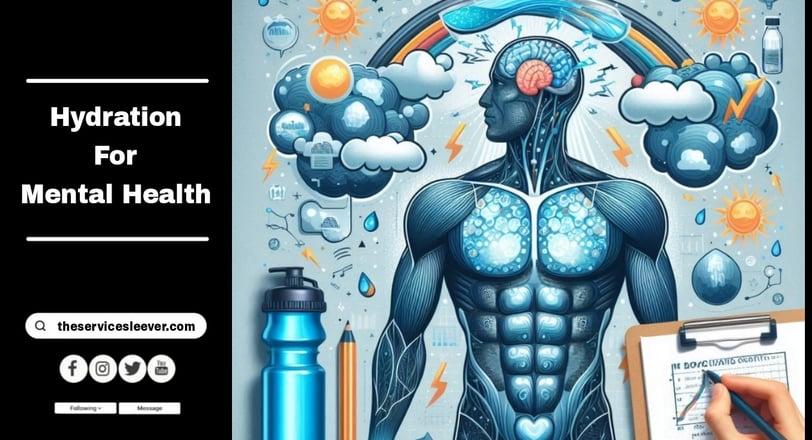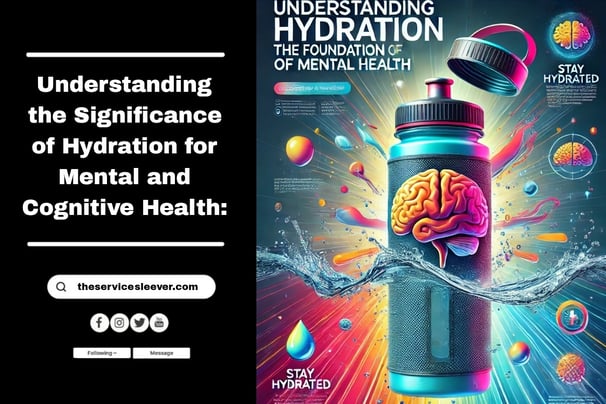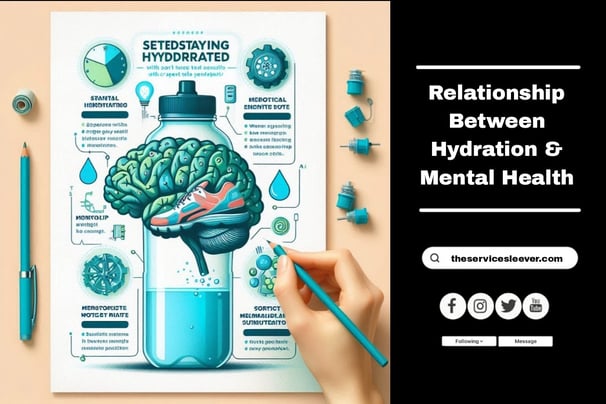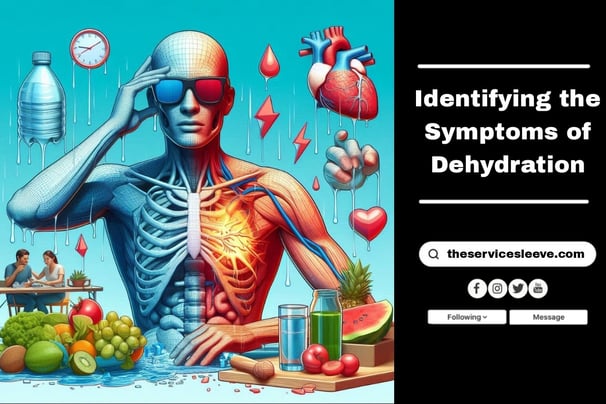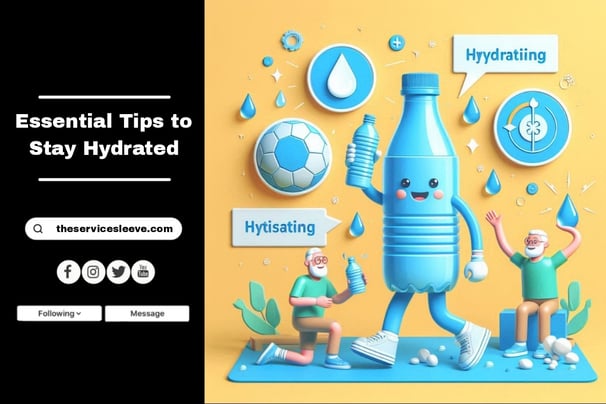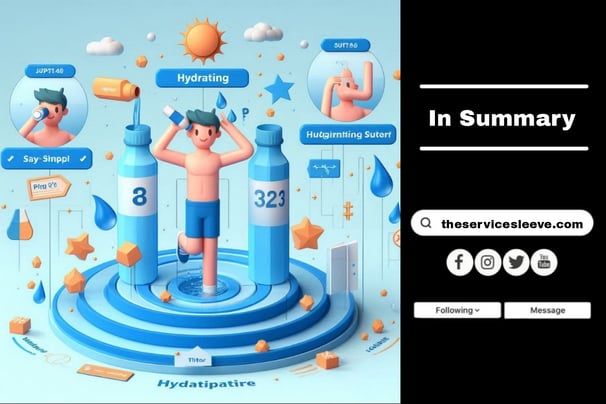Hydration For Mental Health
Learn how hydration for mental health can improve cognitive function and emotional well-being. Get the science behind how water affects brain function as well as useful advice on staying hydrated.
HYDRATION
The small but crucial act of drinking enough water is frequently neglected in our daily pursuit of wellbeing. Drinking enough water is important for mental and cognitive function in addition to its many physical health benefits, which are well-documented. Hydration for mental health is an essential component that can dramatically influence our mood, concentration, and overall brain performance. In this article, we will delve into how water, the most vital nutrient for life, impacts our brain, supports mental clarity, and enhances emotional stability. Making informed decisions to enhance our everyday lives and overall well-being can be achieved by being aware of the relationship between mental health and hydration.
Significance of Hydration for Mental & Cognitive Health:
It's important to understand what hydration entails and why water is indispensable for our body's functions to fully appreciate the role of hydration in mental health. Realizing that every cell, tissue, and organ in our body needs water to function properly is the first step toward being hydrated for mental health.
Approximately 60% of our body weight is composed of water, which is essential to numerous vital functions.
Entire Nutrients Chain: Minerals and vitamins are more easily dissolved in water by allowing our cells to absorb them. This is necessary for maintaining brain health and function.
Controlling Temperature: Water regulates our body temperature through sweating and respiration, ensuring that our brain operates safely.
Waste Removal: Water is essential for the removal of waste and toxins from the body, which helps avoid accumulation that might negatively impact brain function.
Keeping the brain properly hydrated is essential for preserving its optimal function. Because the brain is made up of about 75% water. Hydration has an impact on the transport of vital nutrients and the elimination of waste from the brain, as well as neurotransmission, the process by which nerve cells communicate.
It's clear that drinking water has benefits for mental health beyond merely slake thirst. Proper hydration improves cognitive functions such as memory, attention, and processing speed. Even a slight dehydration can cause mood swings and negatively impact our ability to think clearly. Understanding hydration is the first step toward acknowledging its significant impact on mental health. Drinking plenty of water on a daily basis lays the groundwork for a healthy mind and optimal cognitive function.
Relationship Between Hydration & Mental Health:
There is a strong link between hydration and mental function. Sufficient hydration is essential for maintaining mental clarity and general brain health in addition to physical well-being. Even a small amount of dehydration can have a major negative effect on cognitive function and performance. Therefore, maintaining adequate hydration is essential for mental health, as discussed earlier.
Studies have demonstrated that dehydration can affect a number of cognitive functions, such as:
Attention: The brain's capacity to concentrate and maintain attention over time gets reduced by dehydration. Insufficient water in the body makes it harder to focus on tasks that take a long time.
Short-Term Memory: Low levels of hydration have been shown in studies to negatively impact short-term memory. Simple tasks like following directions or memorizing a list of words get harder.
Executive Functions: These include higher-order thinking abilities like problem solving, planning, and decision-making. These processes can be affected by dehydration, which can result in less efficiency and slower reaction times.
Furthermore, keeping emotional stability requires adequate hydration for mental health. Dehydration can cause mood swings, elevated anxiety, and even depressive symptoms. These emotional states then have an additional effect on cognitive processes, which starts a vicious cycle of poor mental functioning.
It is important to note that the brain requires a delicate balance of water and electrolytes to function properly. The flow of nutrients and neurotransmitters required for clear thinking and efficient brain cell communication can be disrupted by even a small imbalance.
Hydration for Mental Health: Conditioning Mood & Emotional Well-Being
The effect of hydration on mood and emotional well-being is a critical component of overall mental health. Hydration for mental health is important for more than just cognitive function. It also affects how we feel emotionally and how we manage stress.
The Relationship between Mood and Hydration:
Water is necessary for the energy production process of the brain. This energy production process of the brain can be low when our bodies get dehydrated. This can cause us to be tired and lethargic. Accordingly, our mood can be greatly affected by this lack of energy. It can make us feel upset and less able to handle pressure.
Emotional Instability and Dehydration: Most of the modern research and studies have indicated that even slight dehydration can cause notable changes in your mood. Some of those emotional effects of dehydration can be stated as follows:
Enhanced Intolerance: It can be difficult to keep a positive attitude and handle day-to- day challenges when dehydrated. It can lead to frustration and increase the stress level in your mind.
Higher Anxiety: Anxiety and nervousness can be brought on by dehydration of the body. This is due in part to the fact that dehydration disrupts the electrolyte balance, which is necessary for nerve function and stability.
Signs of Depression: Persistent dehydration has been associated with depression symptoms. Inadequate hydration can disrupt the balance of hormones and neurotransmitters that regulate mood, resulting in feelings of sadness and low energy.
As a summary, maintaining proper hydration for mental health is not only crucial for cognitive performances. It also contributes to emotional stability and well-being as well. Adequate water intake can help us maintain a positive mood, reduce anxiety, and improve our overall mental health.
Boost your cognitive performance with consistent hydration. Our water container sleeves make it easy to carry your drink with you, ensuring you stay sharp and focused all day long.
Identifying Dehydration Symptoms:
It's critical to recognize the symptoms of dehydration in order to preserve mental and physical well-being. Even a slight dehydration can have a detrimental effect on mood and cognitive function, as we discussed earlier. So maintaining adequate hydration is crucial for mental wellness. Early detection of symptoms can help to avoid these negative consequences that can happen and guarantee to maintain yourself in the best possible mental and emotional health condition.
Common Signs of Dehydration:
There are several ways that dehydration can appear, and being aware of these symptoms can help you to take actions quickly as well as get away from pronging to the above health issues:
Feeling Thirsty: This is the clearest indication that people are frequently lagging. Your body has already begun to dehydrate by the time you feel thirsty.
Dry Mouth & Lips: Chapped lips and a continuous dry mouth sensation can also be mentioned as early indicators of dehydration.
Dark Urine: The color of your urine is a good way to gauge your hydration level of the body. Urine that is amber or dark yellow in color indicates that you should drink more water.
Fatigue: Feelings of exhaustion and lethargicness may arise from dehydration. Because it reduces blood volume and makes the heart work harder to pump blood.
Headaches: Dehydration can cause headaches due to a decrease in brain fluid, affecting its cushioning and leading to pain.
Mental and Emotional Signs of Dehydration:
Understanding the impact of dehydration on your mental and emotional states is another aspect of maintaining mental health through hydration.
Poor Concentration: Your concentration and focus can be low due to dehydration. It may make tasks appear more challenging.
Memory Problems: Affected short-term memory can result in forgetfulness and trouble remembering things. So it is very important to drink sufficient water and stay well hydrated if you are a student.
Mood Fluctuations & Irritability: Increased irritability and mood swings are among the mood changes that can result from dehydration.
Fear & uncertainty: Being dehydrated can make it more difficult to maintain composure when experiencing anxiety and nervousness.
Symptoms of Depression: Dehydration that persists over time can exacerbate depressive symptoms and general moodiness.
Severe Dehydration Symptoms:
Mild dehydration can be treated by increasing water intake. But immediate medical attention necessitates in severe dehydration conditions. Severe dehydration symptoms include:
Rapid Heartbeat & Breathing: The body finds it difficult to keep blood pressure stable without adequate hydration level on the body. It can cause an elevated heart rate and rapid breathing conditions.
Sunken Eyes & Dry Skin: Sunken eyes and dry and shriveled skin can be motioned as a few physical signs of extreme dehydration.
Confusion & Disorientation: Severe dehydration can cause more serious disorientation, confusion, and even unconsciousness conditions.
Essential Tips for Staying Hydrated:
Now you have a general understanding that sustaining optimal hydration is essential for promoting your mental and physical well-being. Accordingly, maintaining proper cognitive function, emotional stability, and general well-being is ensured by adequate hydration for mental health. Here are a few useful suggestions to keep you hydrated throughout the day.
1. Drink Water Regularly.
Set Reminders: Make frequent reminders to yourself to drink water by using an app for hydration on your phone.
Hydration Timetable: Try to create a personalized routine, such as having a glass of water before bed, before meals, and in the morning.
2. Have Water-Rich Foods:
Fruits and Vegetables: Incorporating foods with high water content into your diet, such as oranges, strawberries, cucumbers, and watermelon, can help you win these hydration challenges.
Soups and Broths: These are excellent sources of hydration, especially in colder weather.
3. Carry a Reusable Water Container with Protective Sleeve:
Convenience: Carry a water bottle with you to drink throughout the day.
Monitor Intake: Track your intake with bottles that have measurement markers.
4. Add Flavor to Your Water:
Enhancers of Flavor: Garnish your water with lemon, lime, cucumber, or mint where possible.
Try different varieties: Try different combinations of fruits and herbs that can be helpful for your overall well-being while maintaining your hydration level.
5. Keep an Eye on Your Hydration:
Color of Urine: Light yellow urine indicates that you are properly hydrated.
Physical Indications: Be mindful of headaches, exhaustion, and dry mouth conditions.
6. Balance Electrolytes:
Incorporate electrolyte drinks, especially if you are exercising or working in hot weather. Always try to eat foods like bananas and yogurt that are high in electrolytes, which helps to raise your hydration level of the body.
Summary
When you've read this far, you'll realize that hydration for mental health is an important part of maintaining overall well-being. Drinking enough water promotes mental clarity and emotional stability in addition to physical well-being. We can improve the quality of our daily lives by making well-informed decisions by knowing the link between mental health and hydration.
The effects of hydration on the brain have been discussed in this article in a number of ways as follows. The article was started by recognizing Hydration and realizing the importance of water for brain function and its basic role in the body. After that, it focused on mental capacity by highlighting the ways that proper hydration improves cognitive performance and dehydration can impede attention, memory, and executive functions. The relationship between mood and emotional well-being was discussed by examining how appropriate hydration can enhance emotional health and the impact of dehydration on mood, including irritability, anxiety, and depressive symptoms. And finally, articles end up giving helpful guidance on how to stay as hydrated as possible by drinking plenty of water, eating foods high in water, and changing one's lifestyle.
Prioritizing hydration for mental health can help you maintain a clear mind, a better mood, and improved cognitive abilities. Including these routines in your daily life will enhance your overall quality of life in addition to your mental well-being. Recall that maintaining proper hydration is an easy yet effective strategy to look after your physical and emotional well-being. Make it a habit to drink plenty of water each day, and encourage those around you to do the same. You'll be making a crucial step toward living a happier, healthier life if you do this.
